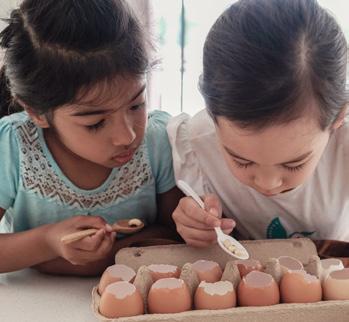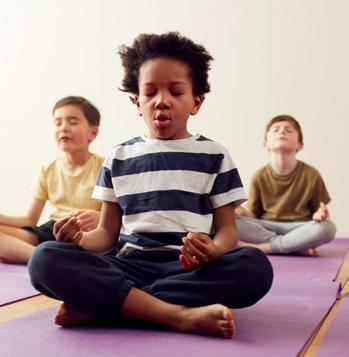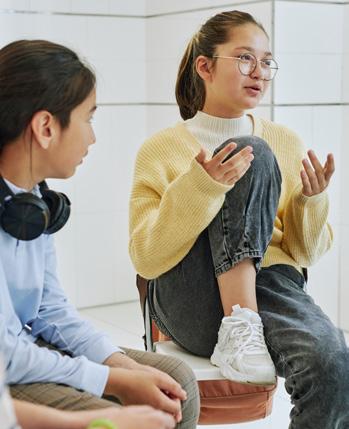
5 minute read
What’s New in Montessori?
Innovations & Timeless Traditions for 2025-2026
Every September brings a familiar energy to Montessori classrooms: new faces, new lessons, and new opportunities to explore the world. As the 2025-2026 school year begins, parents may wonder—what’s changing in Montessori education? The beauty of Montessori is its foundation of timeless principles, yet it also evolves to meet the needs of today’s children and families.
Here’s a look at what’s fresh and what remains steadfast in Montessori classrooms this year.
Timeless Traditions That Still Shine
At its core, Montessori remains true to the vision Maria Montessori shared over a century ago: an education designed to cultivate independence, concentration, respect, and a lifelong love of learning. Some things never change—and for good reason.
• The Prepared Environment: Classrooms are still meticulously organized, inviting, and scaled to the child’s size and perspective. This empowers children to navigate their space independently.
• The Three-Year Cycle: Multiage classrooms continue to foster mentorship, leadership, and deep, individualized learning. Children progress at their own pace within a community that mirrors family life.
• Hands-On, Self-Correcting Materials: Montessori materials remain the gold standard for concrete, tactile learning. Whether it’s the Pink Tower in early childhood or Algebra Tiles in the upper levels, these tools translate abstract concepts into something a child can touch and explore.
• Grace and Courtesy: The social fabric of the classroom remains intentional. Children are still guided in respectful communication, empathy, and collaboration—skills as essential in life as reading or math.

Emerging Patterns
While the foundation remains strong, Montessori schools today are thoughtfully integrating new insights, tools, and strategies to keep the experience relevant and supportive.
by Montessori Foundation Staff

• Mindfulness and Well-Being Programs: Many Montessori schools are now embedding mindfulness practices into the daily routine—guided breathing, yoga stretches, or quiet reflection times help children develop emotional regulation in a fast-paced world.
• Enhanced Outdoor Classrooms: Outdoor learning spaces have expanded well beyond playgrounds. Schools are incorporating nature-based classrooms, gardening, and environmental stewardship activities that extend the Montessori curriculum into the natural world.
• Contemporary Cultural Studies: Montessori’s focus on geography, history, and culture now includes current global challenges. Topics like climate change, sustainability, and global citizenship are becoming integrated in ways that are age-appropriate and action-oriented. Typically, there is no political agenda. Montessori families represent a wide range of traditions and perspectives. The common theme is to honor the country in which we live, while learning about and celebrating the many cultures and traditions of the people who came to our country from the global community.
• Montessori and Technology—With Care: While Montessori remains cautious about screens for young children, thoughtfully curated digital tools are increasingly used with older students. Tools like digital microscopes, coding platforms, and collaborative research software enhance exploration in science and humanities without replacing hands-on learning.
• Inclusion: Many Montessori schools are deepening their commitment to inclusive education. This includes diversifying classroom materials and literature, celebrating a broader range of cultural traditions, and fostering conversations about equity, belonging, and respect.
The
Montessori
Continuum: Stronger Than Ever
Another exciting development is the growth of Montessori education beyond early childhood. More schools are offering Montessori programs for elementary, middle, and even high school students, giving families the option to continue this philosophy through adolescence. These programs incorporate more complex projects, entrepreneurship, and real-world experiences—all still grounded in Montessori’s developmental approach.

A Living Tradition
Montessori is often described as both an art and a science of education. Its enduring strength lies in the balance between preserving proven methods and embracing innovations that serve today’s learners. As you send your child off to school this fall, you can be confident that they are part of a living tradition—one that honors the child’s natural development while preparing them for the world they will inherit.
2025 Montessori-Inspired Trends for Parents
Montessori education doesn’t stop at the classroom door. Many parents want to bring elements of the Montessori approach into their homes, and new ideas are making it easier than ever. Here’s what’s trending with Montessori families this year:
• Home Organization for Independence: Parents are rethinking home spaces to help children do more for themselves—think low shelves, accessible kitchen tools, and self-serve snack stations. New modular furniture systems designed for Montessori homes are also gaining popularity.
• Mindful Tech Use: Families are adopting digital wellness practices— setting boundaries around screen time and using tech-free times for family connection. Some are introducing “tech sabbath” days on weekends to rest from screens altogether.
• Nature Play and Outdoor Learning: With the growth of outdoor classrooms, parents are creating home gardens, nature play areas, and even simple outdoor art spaces to encourage exploration and physical activity.
• Diverse Bookshelves: Parents are expanding their home libraries with children’s books that celebrate diverse cultures, perspectives, and stories— mirroring the inclusion that we tend to see in schools.
• Montessori Parenting Courses: A growing number of online courses and parent education groups help families learn how to apply Montessori principles in daily parenting, including positive discipline, fostering independence, and nurturing curiosity at home.
By embracing some of these trends, families can extend the benefits of Montessori education and help their children thrive in every environment.








